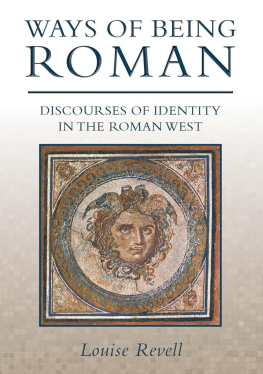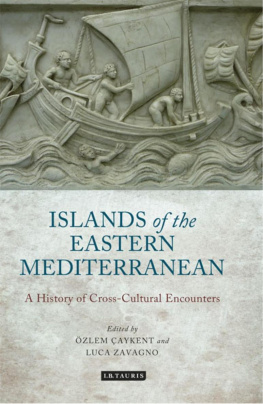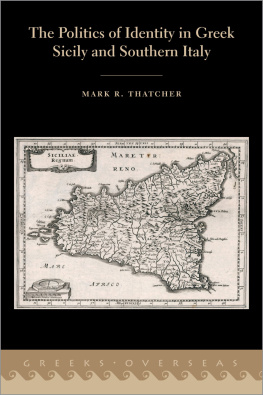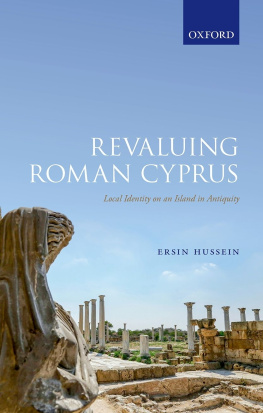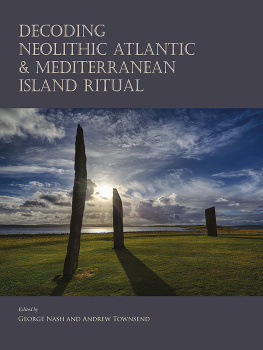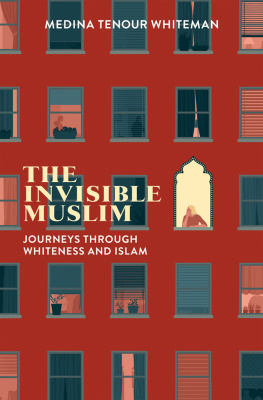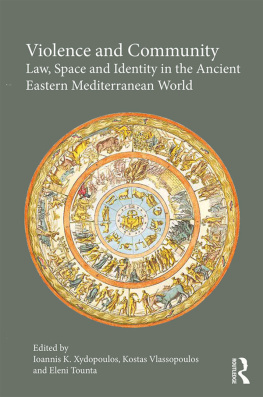Insularity and Identity in the Roman Mediterranean
Edited by
Anna Kouremenos
Published in the United Kingdom in 2018 by
OXBOW BOOKS
The Old Music Hall, 106108 Cowley Road, Oxford OX4 1JE
and in the United States by
OXBOW BOOKS
1950 Lawrence Road, Havertown, PA 19083
Oxbow Books and the individual authors 2018
Paperback Edition: ISBN 978-1-78570-580-9
Digital Edition: ISBN 978-1-78570-581-6 (epub)
Kindle Edition: ISBN 978-1-78570-582-3 (mobi)
A CIP record for this book is available from the British Library
Library of Congress Control Number: 2018942555
All rights reserved. No part of this book may be reproduced or transmitted in any form or by any means, electronic or mechanical including photocopying, recording or by any information storage and retrieval system, without permission from the publisher in writing.
For a complete list of Oxbow titles, please contact:
UNITED KINGDOM
Oxbow Books
Telephone (01865) 241249, Fax (01865) 794449
Email:
www.oxbowbooks.com
UNITED STATES OF AMERICA
Oxbow Books
Telephone (800) 791-9354, Fax (610) 853-9146
Email:
www.casemateacademic.com/oxbow
Oxbow Books is part of the Casemate Group
Front cover: Mosaic fragment depicting two men on a boat. From Carthage, AD 200-250. Courtesy of Penn Museum, image # 3348.
Back cover: General View of the 2nd Century AD South Building, Sanctuary of Apollo Hylates, Kourion, Cyprus (Photo: J. M. Gordon).
Contents
About the Authors
Anna Kouremenos is Deutsche Forschungsgemeinschaft fellow in the research group Migration and Mobility in Late Antiquity and the early Middle Ages at the University of Tbingen. She received her D.Phil. from the Institute of Archaeology, University of Oxford and her research interests focus on the history and archaeology of the eastern provinces under Roman rule, Greek archaeology, migration and identity, archaeological theory, and the reception of antiquity. In addition to publishing several academic articles, she is the co-editor of Roman Crete: New Perspectives (with Jane Francis), Continuity and Destruction in the Greek East: the transformation of monumental space from the Hellenistic Period to Late Antiquity (with Sujatha Chandrasekaran), and From Pella to Gandhara: Hybridization and Identity in the Art and Architecture of the Hellenistic East (with Sujatha Chandrasekaran and Roberto Rossi).
Jody Michael Gordon is an Assistant Professor of Humanities and Social Sciences at Wentworth Institute of Technology in Boston where he teaches classes on ancient history, art, and architecture, as well as digital humanities. He received his Ph.D. in classical archaeology from the Department of Classics at the University of Cincinnati and he is the Assistant Director of the Athienou Archaeological Project in the Republic of Cyprus.
Alkiviadis A. Ginalis received his D.Phil. in Archaeology from the University of Oxford in 2014, with a thesis on Byzantine ports. Central Greece as a link between the Mediterranean and the Black Sea. After a European Union Marie Curie Fellowship at the University of Bremen, he is currently Research Fellow at the Rmisch-Germanisches Zentralmuseum Mainz and Guest-Researcher at the Austrian Academy of Sciences. His main academic interests focus on Byzantine harbour studies and Mediterranean maritime archaeology, including seafaring, trading networks and economic systems of the Roman to Byzantine periods.
Sophia Zoumbaki is Director of Research at the National Hellenic Research Foundation (NHRF) in the Institute of Historical Research (IHR), Section on Greek and Roman Antiquity (KERA). She is the author of numerous articles and edited volumes. Her research interests include the Hellenistic and Roman history of Greece, epigraphy, prosopography and onomastics, civic institutions, and the economy and society of the Greek poleis.
Danijel Dzino is Lecturer in the Departments of Ancient History and International Studies (Croatian Studies) at Macquarie University, Sydney, having obtained his Ph.D. in Classics at the University of Adelaide. His research interests focus on ancient and early medieval Illyricum, particularly the identity transformations undergone by the indigenous population of the region in Roman and post-Roman times. He is the author of Becoming Slav, Becoming Croat: Identity Transformations in Post-Roman and Early Medieval Dalmatia (2010) and Illyricum and Roman Politics 229 BCAD 68 (2010).
Maxine Anastasi is Lecturer in Roman Archaeology in the Department of Classics and Archaeology at the University of Malta. She received her D.Phil. from the Institute of Archaeology at the University of Oxford and her main research interests include the study of Punic and Roman pottery, the archaeology of the central Mediterranean in antiquity, and fieldwork training and methodologies.
Andrea Roppa is STARS Programme Research Fellow at the University of Padova (Italy). He received his Ph.D. in Classical Archaeology from the University of Padova and carried out postdoctoral research at the Universities of Glasgow and Leicester (UK). His research interests are in the study of the materiality, connectivity and cultural identity of urban and rural communities of the Iron Age to Hellenistic western Mediterranean. He has carried out extensive fieldwork in the western Mediterranean, particularly on Sardinia, where he currently directs excavations at the site of Nuraghe SUrachi, and co-directs the Landscape Archaeology of Southern Sardinia project. His publications include the monograph Comunit urbane e rurali nella Sardegna di et ellenistica , the co-edited volume Materiali e contesti nellet del Ferro sarda , and a number of publications in peer-reviewed international journals, including The Journal of Mediterranean Archaeology .
Jean-Baptiste Mary After completing a degree in history at the University of Corsica and a Masters degree in land and maritime operational archeology at the University of Aix-Marseille, Jean-Baptiste Mary is currently a Ph.D. student at Lumire Lyon 2 University under the supervision of P. Arnaud and E. Rieth. His dissertation focuses on the maritime cultural landscape. He has participated in various archaeological excavations since the age of twenty and is a founding member of the association for archaeological research in Corsica. His current studies focus on the insular culture of the island of Corsica through a multidisciplinary and diachronic investigation.
Swii Yii Lim is currently completing her D.Phil. in the Institute of Archaeology, University of Oxford on the subject of Roman mining in the province of Dacia. Her main academic interests include the Roman economy, Roman gold mining, and the interdisciplinary study of Rome and China.
Preface
This volume had its beginnings in a TRAC panel I organised at the University of Reading, UK in March 2014. Since my own doctorate at the University of Oxford concentrated on houses and identity on the island of Crete under Roman rule, I thought it would be worthwhile to consider how other Mediterranean islands conceptualised their own identities in the Roman period vis--vis their insularities.
The aim of this volume is to discern, through several case studies, similarities and differences between the islands of the eastern and western parts of the Roman Empire and to investigate how insular environments, mobility, connectivity and materiality affected the development and maintenance of social and cultural identities throughout the Roman period. The papers are arranged geographically from east to west and the case studies focus on four large islands Cyprus, Crete, Sardinia and Corsica and four island groups the Northern Sporades, the Ionian Islands, the Dalmatian Islands, and Malta (including Gozo).


